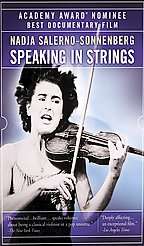Speaking in Strings
| Speaking in Strings | |
|---|---|
 Film poster | |
| Directed by | Paola di Florio |
| Produced by | Paola di Florio, Lilibet Foster |
| Starring | Nadja Salerno-Sonnenberg |
| Music by | Karen Childs |
| Distributed by | Seventh Art Releasing |
Release dates | DVD: June 26, 2001 Video: June 26, 2001 Theatrical: October 29, 1999 |
Running time | 73 mins. |
| Country | United States |
| Language | English |
| Box office | $6,859 |
Speaking in Strings is a 1999 documentary film directed by Paola di Florio. The film is based on the life of Italian-born violinist Nadja Salerno-Sonnenberg, and it received a nomination for Best Feature Documentary Film at the 72nd Academy Awards.[1]
Content
The film is based on the life and career of Italian-born classical violinist Nadja Salerno-Sonnenberg, and provides an insight into the style of the artist - who is noted by critics for putting her own emotions too much into her musical performances. The film started from Salerno-Sonnenberg's birth in Rome, and followed her story as she moved to United States at age 8 and was brought up by her mother in New Jersey. She grew up with her brother who is also a musician. The film concentrates on the violinist's difficult childhood as she had to experience scorn and laughter by her friends when she played a recording of Brahms in front of the class. This is among the incidents that caused the artist to develop her overly emotional performing style and personality as she became a professional violinist and rose to stardom. In the documentary, Salerno-Sonnenberg talks about periods of depression in her life and her suicide attempt; she also discusses her views on how music is connected to human emotions.
Production and release
The documentary was directed by Paola di Florio, a childhood friend of Salerno-Sonnenberg.[2] Salerno-Sonnenberg appeared as herself in the film.[3] Speaking in Strings was co-produced by two companies, Asphalt Films and CounterPoint Films.[3]
Speaking in strings premiered at Sundance Film Festival in Park City, Utah in 1999.[4] This same year, the documentary appeared in several film festivals, including Florida Film Festival, Mill Valley Film Festival, Newport International Film Festival, and Seattle International Film Festival.[5] The film was released theatrically on October 29, 1999.[6] A DVD version was released on June 26, 2001.[6]
Reception
Box office
The film earned $1,519 in its opening weekend in one theater,[7] and went on to gross $6,859 domestically within two weeks from release.[7]
Critical reaction
The documentary received mixed response from critics. It got a score of 56 out of 100 based on 10 reviews at Metacritic,[6] and 3.5 out of 4 stars at TV Guide.[8] In general, critics agreed on the point that the film lacked information on the private life of Salerno-Sonnenberg, particularly her romance relationship which was mentioned during the documentary.[9][10] Edward Guthmann of San Francisco Chronicle gave generally positive reviews, stating that the film "takes us inside Salerno-Sonnenberg's experience, challenging us to respect a woman so naturally intense that she can't help wearing out friends and colleagues, and alienating members of her audience."[2]
Meanwhile, San Francisco Examiner 's critic Allan Ullrich criticised that, due to the musical excerpts used in the documentary, "the movie can't help looking like a prolonged promotional video." [9] Critic Robert Hilferty of Village Voice called the documentary "a clumsy labor of love with unforgivable lapses", and noted that it "fails to show why Salerno-Sonnenberg's controversial interpretations are so original and valid." However, he added that it "sometimes rises to a compelling portrait of a neurotic personality". According to Hilferty, the documentary leaves an impression that music is the factor that "ruined" the life of the violinist.[11]
Nominations and awards
Despite the mixed reviews by critics, Speaking in strings received a nomination for Best Feature Documentary at the 72nd Academy Awards.[12] The film won a Jury Award for Documentary Competition at the Newport International Film Festival [13] and the same year, won a cable Ace Award.
References
- ↑ "NY Times: Speaking in Strings". NY Times. Retrieved 2008-11-22.
- 1 2 Intense Portrait of High-Strung Violinist from San Francisco Chronicle
- 1 2 "Movies: Details for Speaking in Strings". The New York Times.
- ↑ Film profile from New York Times
- ↑ speaking in strings review from Variety magazine
- 1 2 3 Speaking in Strings (1999): Reviews
- 1 2 Speaking in strings box office from Box Office Mojo
- ↑ Speaking In Strings Review | TVGuide.com
- 1 2 "Speaking' doesn't say much from San Francisco Examiner
- ↑ Film review from New York Times
- ↑ String Me Up! String Me Down! from Village Voice
- ↑ SEVENTH ART RELEASING profile From filmindependent.org
- ↑ Award Winners Through the Years from NewportFilmFestival.com
External links
- Speaking in strings at Internet Movie Database
- CounterPoint Films Company Website